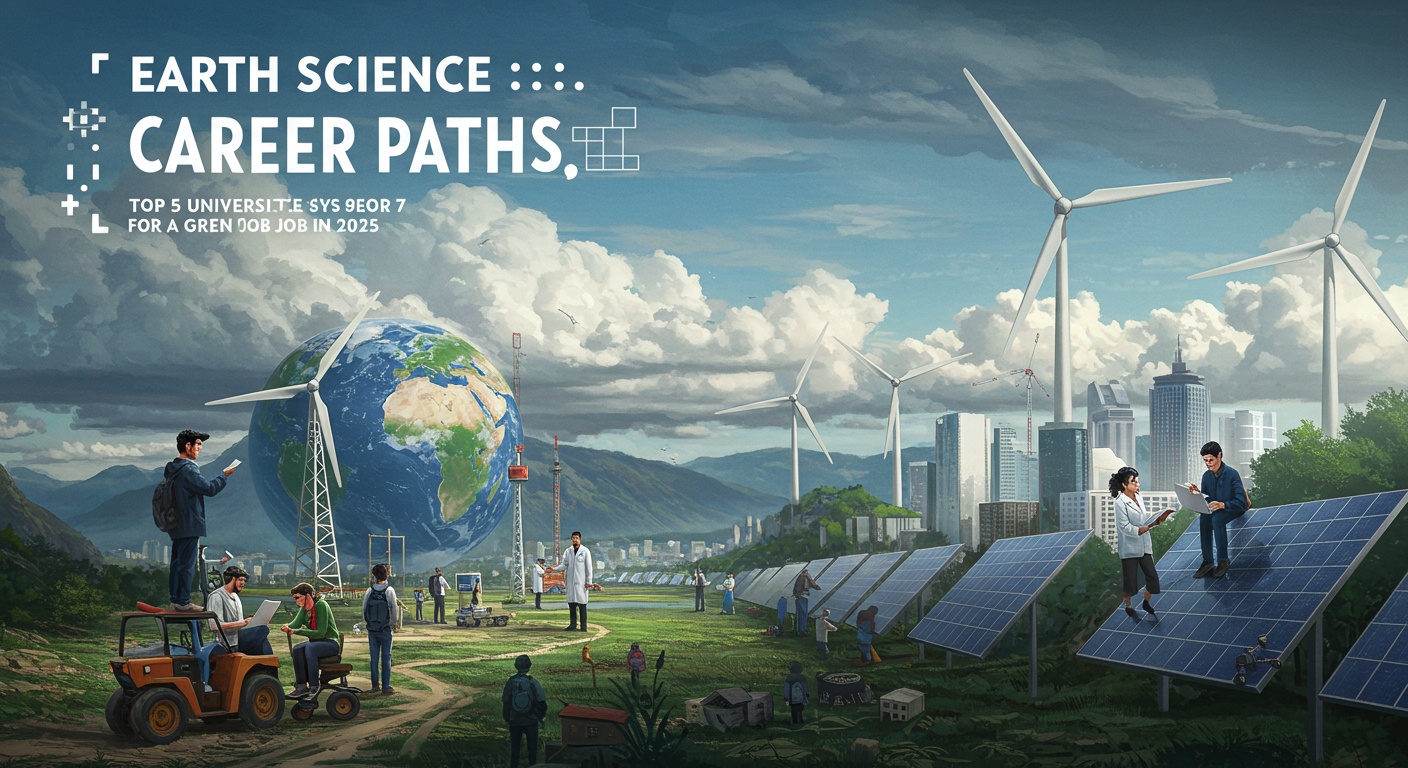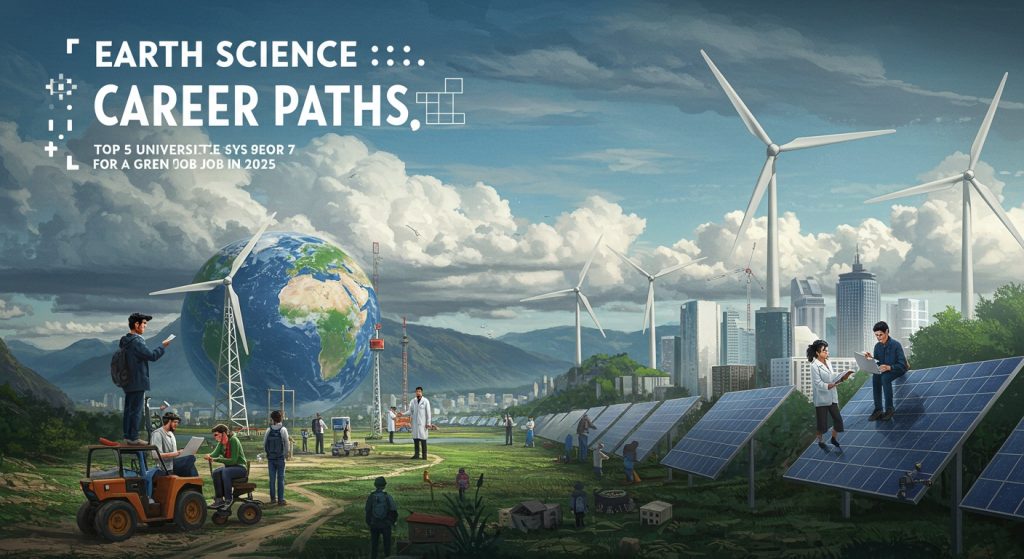The green jobs market is exploding, fueled by the urgency of climate change and advancements in renewable energy technologies like perovskite solar cells and carbon capture. But landing a fulfilling and impactful role in this competitive landscape requires more than just passion. Securing a cutting-edge education focused on Earth systems and sustainability is paramount. We’ll explore the top universities leading the charge in preparing graduates for the green careers of 2025. Consider factors like research funding in areas such as sustainable agriculture and climate modeling, industry partnerships offering practical experience. Specialized programs designed for emerging fields. By understanding these critical elements, prospective students can make informed decisions and position themselves for success in the rapidly evolving environmental sector.

Understanding the Green Job Landscape in Earth Science
The “green job” sector is booming, fueled by global concerns about climate change, resource depletion. Environmental degradation. In Earth Science, green jobs involve applying scientific principles to protect and restore the environment, develop sustainable practices. Mitigate the impacts of human activities. Key areas within Earth Science that offer green job opportunities include:
- Renewable Energy: Geothermal energy exploration and production, solar and wind farm site assessment. Developing energy storage solutions.
- Environmental Remediation: Cleaning up contaminated sites, developing methods for waste reduction and recycling. Managing hazardous materials.
- Climate Change Mitigation and Adaptation: Modeling climate scenarios, developing strategies to reduce greenhouse gas emissions. Assessing the vulnerability of communities to climate change impacts.
- Water Resource Management: Ensuring sustainable water supplies, managing water pollution. Developing strategies for water conservation.
- Sustainable Agriculture: Promoting soil health, reducing the environmental impact of farming practices. Developing sustainable food production systems.
Essential Skills for a Green Career in Earth Science
Landing a green job in Earth Science requires a solid foundation in scientific principles, coupled with specialized skills relevant to the chosen field. Here’s a breakdown of key skills:
- Scientific Knowledge: A deep understanding of Earth systems, including geology, hydrology, atmospheric science. Ecology.
- Data Analysis and Modeling: Proficiency in using software and statistical methods to examine environmental data, model complex systems. Predict future trends. This often involves Geographic details Systems (GIS) and remote sensing technologies.
- Problem-Solving: The ability to identify environmental problems, review their causes. Develop effective solutions.
- Communication: Strong written and oral communication skills to effectively convey scientific details to diverse audiences, including policymakers, the public. Other scientists.
- Regulatory Knowledge: Familiarity with environmental laws, regulations. Policies at the local, national. International levels.
- Technical Skills: Depending on the specific role, this may include skills in areas such as drilling, sampling, laboratory analysis. Environmental monitoring.
Top 5 Universities for Green Earth Science Careers in 2025
Choosing the right university can significantly enhance your prospects for landing a green job after graduation. These universities are recognized for their strong Earth Science programs, research opportunities. Connections to the green sector. These programs often include coursework and research focused on sustainability, environmental science. Renewable energy.
- Stanford University (Stanford, California): Renowned for its School of Earth, Energy & Environmental Sciences, Stanford offers a wide range of programs focused on sustainable energy, climate science. Environmental remediation. The university has strong ties to Silicon Valley and the renewable energy industry, providing students with excellent networking and internship opportunities. Stanford’s Woods Institute for the Environment is a leading research center focused on finding solutions to global environmental challenges.
- University of California, Berkeley (Berkeley, California): UC Berkeley’s College of Natural Resources and the Department of Earth and Planetary Science offer cutting-edge research opportunities in areas such as climate change, biodiversity conservation. Sustainable agriculture. The university’s location in the San Francisco Bay Area provides access to numerous environmental organizations and companies. The Energy and Resources Group (ERG) offers an interdisciplinary approach to energy and environmental issues, preparing students for careers in policy, consulting. Research.
- Massachusetts Institute of Technology (MIT) (Cambridge, Massachusetts): MIT’s Department of Earth, Atmospheric and Planetary Sciences (EAPS) is a leader in climate science, oceanography. Environmental engineering. The university’s Energy Initiative (MITEI) fosters collaboration between researchers, industry. Government to develop sustainable energy solutions. MIT’s strong emphasis on technology and innovation makes it an excellent choice for students interested in developing new tools and approaches for addressing environmental challenges.
- University of British Columbia (UBC) (Vancouver, British Columbia, Canada): UBC’s Faculty of Science and the Institute for Resources, Environment and Sustainability (IRES) offer comprehensive programs in environmental science, resource management. Sustainable development. Vancouver’s reputation as a green city and its proximity to diverse ecosystems provide students with unique learning and research opportunities. UBC is a leader in sustainability research and education, with a strong focus on community engagement and social responsibility.
- ETH Zurich (Zurich, Switzerland): ETH Zurich’s Department of Earth Sciences is a world-renowned center for research in areas such as climate change, geophysics. Environmental geochemistry. Switzerland’s commitment to sustainability and its strong environmental regulations create a vibrant green job market. ETH Zurich’s focus on interdisciplinary research and its collaborations with industry and government make it an excellent choice for students seeking to address complex environmental challenges.
Differentiating Factors Between University Programs
When choosing a university for your Earth Science studies, it’s crucial to compare programs based on several key factors:
| Factor | Description |
|---|---|
| Research Opportunities | The availability of research projects, funding. Faculty expertise in your area of interest. Look for universities with active research centers and laboratories focused on sustainability and environmental science. |
| Faculty Expertise | The qualifications and experience of the faculty members teaching and conducting research in the program. Look for faculty with strong track records in publishing research, securing grants. Collaborating with industry. |
| Curriculum | The range of courses offered, the depth of specialization. The interdisciplinary nature of the program. Look for programs that offer a balance of theoretical knowledge and practical skills. That allow you to tailor your studies to your specific interests. |
| Industry Connections | The university’s relationships with companies, government agencies. Non-profit organizations in the green sector. Look for universities that offer internships, co-op programs. Networking events with potential employers. |
| Location | The university’s location and its proximity to relevant environmental resources, industries. Policy centers. Consider universities located in areas with strong environmental regulations, a thriving green economy. Diverse ecosystems. |
Real-World Applications and Career Examples
Graduates from these top universities are well-prepared for a variety of green jobs in Earth Science. Here are a few examples:
- Environmental Consultant: Assessing environmental impacts, developing remediation plans. Advising companies on environmental compliance.
- Renewable Energy Specialist: Designing and implementing renewable energy projects, such as solar farms and wind turbines.
- Climate Scientist: Conducting research on climate change, modeling future climate scenarios. Developing strategies for mitigation and adaptation.
- Hydrologist: Managing water resources, assessing water quality. Developing strategies for water conservation.
- Geoscientist: Exploring for natural resources, assessing geological hazards. Developing sustainable mining practices.
- Sustainability Manager: Implementing sustainability initiatives within organizations, reducing environmental impacts. Promoting responsible resource use.
For example, a graduate from Stanford University might work for a company like Tesla, developing innovative energy storage solutions. A graduate from UC Berkeley might work for the Environmental Protection Agency (EPA), developing regulations to reduce air pollution. A graduate from MIT might work for a startup developing new technologies for carbon capture and sequestration. These universities equip students with the knowledge and skills to make a real difference in the fight against climate change and environmental degradation.
Preparing for Your Green Earth Science Career
Beyond choosing the right university, there are several steps you can take to enhance your prospects for a green job:
- Gain Practical Experience: Seek out internships, volunteer opportunities. Research projects in your area of interest.
- Develop Technical Skills: Master relevant software and technologies, such as GIS, remote sensing. Environmental modeling tools.
- Network: Attend conferences, workshops. Career fairs to connect with professionals in the green sector.
- Stay Informed: Keep up-to-date on the latest developments in environmental science, policy. Technology.
- Tailor Your Resume: Highlight your skills and experience that are relevant to the specific job you are applying for.
Conclusion
Choosing the right university is just the first step; now comes the implementation. Recall that institutions like Stanford and MIT, renowned for their earth science programs, offer unparalleled research opportunities and industry connections. Beyond academics, actively seek internships aligned with burgeoning green sectors like renewable energy infrastructure and sustainable urban planning. Practical tip: network relentlessly. Attend industry conferences, connect with professionals on LinkedIn. Don’t be afraid to reach out for informational interviews. Your immediate action items should include tailoring your resume and cover letter to highlight relevant coursework, research experience. Passion for sustainability. Success in this field isn’t just about landing a job; it’s about contributing to a more sustainable future. Quantify your impact – showcase how your skills can reduce emissions, conserve resources, or promote ecological balance. Remember, perseverance and a genuine commitment to environmental stewardship are key metrics for long-term success in this rewarding field.
More Articles
IIT Delhi’s Sustainable Solutions: Engineering A Greener Future For All
Top Material Science Schools For Future Technology And Innovation Leaders
BSc Computer Science: Top In-Demand Career Paths of the Future
IIT Kanpur’s Robotics Program: Innovations Driving The Next Technological Wave
FAQs
So, I’m keen on a ‘green job’ with an Earth Science background. What kind of roles are even out there for 2025?
Great question! Think environmental consultant, renewable energy specialist (solar, wind, geothermal – you name it!) , sustainability manager, geologist focusing on resource management, or even a climate change analyst. , anything where you’re using your Earth Science knowledge to protect or improve the planet’s health. The field is really expanding!
Okay, cool! But why are universities so vital for landing these jobs? Can’t I just learn on the job?
While on-the-job learning is valuable, these roles often require a strong foundation in complex scientific principles, data analysis. Problem-solving. Top universities provide that rigorous training, plus access to cutting-edge research and networking opportunities that can give you a serious leg up.
Alright, spill the beans. What are your top university picks for landing a green job after graduating in 2025 with an Earth Science degree?
Based on program strength, research opportunities. Industry connections, I’d keep an eye on: 1. Stanford University (California), 2. University of California, Berkeley, 3. Massachusetts Institute of Technology (MIT), 4. University of British Columbia (Canada). 5. ETH Zurich (Switzerland). These schools consistently rank high and have strong Earth Science and environmental programs.
Is location a big deal when choosing a university for these types of jobs?
Definitely! Being near research hubs, government agencies, or companies in the green sector can open doors for internships, networking. Even job opportunities after graduation. Think about where you want to work and see if there are strong university programs nearby.
Beyond just the university’s overall ranking, what should I actually look for in their Earth Science program?
Look for programs with a strong focus on sustainability, climate change, renewable energy, or environmental remediation – whatever aligns with your interests. Check out the faculty’s research areas, the availability of specialized courses. Whether they offer hands-on experience like field work or internships.
Let’s say I don’t get into one of those ‘top’ universities. Am I doomed to a non-green career?
Absolutely not! While those universities offer fantastic opportunities, many other excellent programs exist. Focus on finding a school with a strong Earth Science department that aligns with your interests and offers opportunities to gain practical experience. Your skills and passion are what truly matter!
What skills, besides the scientific stuff, will make me a desirable candidate for a green job in Earth Science?
Excellent question! Communication skills (written and verbal) are crucial for explaining complex science to non-scientists. Data analysis and modeling skills are also highly sought after. And don’t forget teamwork, problem-solving. Adaptability – the green sector is constantly evolving!



